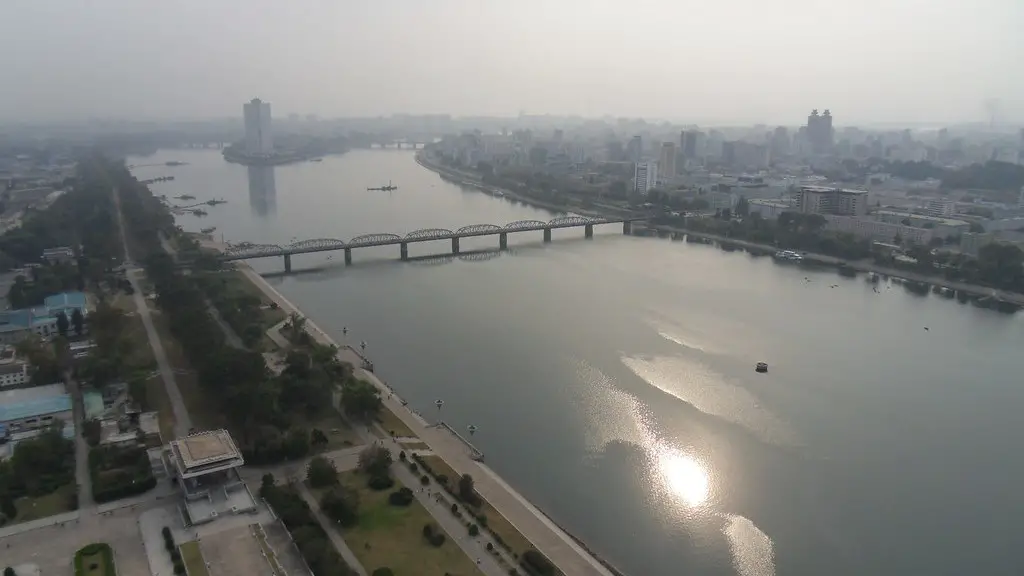Part 1 – Uranium Exploration in North Korea
North Korea is known for its reputation as a nuclear weapons state, and the country’s access to sources of uranium is of significant interest to the international community. Uranium is an essential element for the construction of nuclear weapons and the functioning of nuclear power plants. Despite the nation’s isolationist policies and limited international cooperation, North Korea is believed to possess several sources of uranium within its borders.
The first and most obvious source of uranium is North Korean domestic exploration and mining operations. Reports indicate that North Korea has mining operations located in the northern part of the country, with the majority of these operations focusing on uranium extraction. The country has made significant progress in its exploration and mining operations in recent years and, according to monitoring of the Sino-North Korean border, appears to be continuing in its endeavors.
North Korea is also believed to acquire uranium from other sources. The nation has a long-standing relationship with Iran, and is believed to have exchanged uranium for financial or military aid in the past. Additionally, North Korea is believed to be involved in the global black market for uranium, and is rumored to have acquired the element from sources in former Soviet bloc countries.
The final source of uranium for North Korea is its own nuclear stockpiles. In 2006, the United Nations Security Council imposed sanctions on North Korea for the nation’s refusal to abandon development of nuclear weapons. North Korea declared the sanctions to be a breach of World War II agreements, and began stockpiling uranium in defiance of the resolution. In 2009, the nation declared that it had successfully developed nuclear weapons technology and that its stockpiles of uranium were sufficient to support the nation’s ambitions.
Part 2 – Potential Beneficiaries of North Korean Uranium
The trade in uranium is a precarious endeavor, and is seen as a source of power in the global political landscape. North Korea has long been the subject of economic sanctions and imposed restrictions on its ability to conduct international trade. It is believed that North Korea has been able to use international exchanges in uranium to bolster its nuclear capabilities, as well as to secure foreign aid from other nuclear development-minded states.
North Korea’s relationship with Iran is one of the most prominent potential beneficiaries of its uranium resources. This alliance has enabled North Korea to advance its nuclear capabilities quicker than it could possess domestically, as well as providing it with a means to export its knowledge and technology to other countries in pursuit of nuclear weapons. Additionally, this alliance has provided monetary incentives to North Korea, as well as providing additional resources to ensure the sustainability of its nuclear programs.
Other nations that may benefit from North Korea’s uranium resources are those located in close proximity to the hermit kingdom. North Korea is believed to be selling its uranium to China, Japan, and Russia, although much of this activity is suspected to remain hidden from public view. Additionally, some reports suggest that North Korea has been able to use the proceeds from these trades to purchase materials and resources from other Middle Eastern countries.
Part 3 – Criticism Surrounding North Korean Uranium
The acquisition and sale of uranium by North Korea has been the subject of much criticism from the international community. Many countries view North Korea’s nuclear weapons program as a destabilizing factor in the region, and have demanded that the nation cease its activities. Additionally, many countries are concerned that North Korea could use its uranium resources to develop nuclear weapons and threaten the security of the region.
Furthermore, some countries have accused North Korea of using its uranium resources to fund its nuclear weapons program, rather than using the proceeds from uranium sales to provide its citizens with adequate food and other necessities. This has resulted in many nations, including the United States and Russia, imposing sanctions on North Korea in an effort to stop the nation from using its resources to further its nuclear ambitions.
Despite the criticism, North Korea has remained defiant, asserting that it is determined to pursue its nuclear ambitions and that it will not be deterred by the opinions of the international community. North Korea believes that its nuclear capabilities are integral to its national defense and that any attempts at preventing the nation from achieving its goals will be met with resistance.
Part 4 – International Reaction to North Korean Uranium
The international community has responded in various ways to North Korea’s uranium resource acquisitions. On the one hand, many nations have imposed a variety of sanctions on the nation, including trade restrictions, asset freezes, and diplomatic policies. These sanctions are designed to limit and prevent the nation’s access to uranium, and to make it more difficult for the nation to acquire additional weapons-grade uranium.
On the other hand, many countries are advocating for less punitive measures and a greater focus on diplomatic strategies. These countries hope to ensure that North Korea’s nuclear ambitions remain peaceful and that any use of the nation’s uranium resources are geared towards civil purposes, rather than military applications. They believe that through dialogue, the international community can build a better relationship with North Korea, and that this could encourage further cooperation towards global nuclear disarmament.
Despite these strategies, North Korea continues to acquire resources in defiance of international condemnation. The international community remains uncertain about the nation’s motives and intentions, and efforts to achieve a diplomatic solution have been met with limited success.
Part 5 – Alternative Energy Solutions for North Korea
As tensions over North Korea’s uranium acquisitions continue to grow, many countries have advocated for the nation to pursue alternative sources of energy as an alternative to nuclear weapons. Solar, wind, and geothermal energy have been proposed as viable sources for the nation and provide the potential for North Korea to gain a greater level of autonomy and independence by becoming a leader in renewable energy technology.
Using solar power, North Korea could reduce its reliance on fossil fuels, which are both expensive and in limited supply, while increasing energy security and reliability. Additionally, the country could reduce emissions, improve energy efficiency, and benefit from economic and job opportunities generated by the sustainable energy industry.
Wind power is another viable source of energy for North Korea, with the potential to generate a significant amount of electricity and reduce the nation’s reliance on fossil fuels. Wind turbines could also provide a reliable source of electricity that could be transmitted to other parts of the country.
Geothermal energy has also been proposed as a possible alternative to uranium acquisition in North Korea. Geothermal energy can be used to generate electricity directly from the earth’s heat and can provide a more efficient and cost-effective source of electricity than uranium. Additionally, this method of energy production is more environmentally friendly and does not produce hazardous waste like nuclear weapons.
Part 6 – Impact of North Korean Uranium
North Korea’s access to uranium has had a significant impact on the region and the global political climate. The nation’s uranium stockpiles have enabled it to pursue nuclear weapons development in defiance of international public opinion and sanctions imposed by the United Nations and other countries. Additionally, the nation’s uranium resources have enabled it to acquire foreign aid and resources through trade, as well as to develop nuclear capabilities that exceed what would be possible domestically.
In addition, North Korea’s uranium resources have increased the potential for nuclear weapons proliferation in the region, due to fears that the nation could use its resources for malicious purposes. This has resulted in increased tensions between countries in the region, as well as between North Korea and the international community.
Furthermore, North Korea’s uranium resources has have led to a greater focus on alternate sources of energy, both as an alternative to nuclear weapons development and as an energy source that can benefit the nation without the risks associated with uranium acquisition. The implementation of solar, wind, and geothermal energy solutions could provide North Korea with an alternative to reliance on uranium and also improve the nation’s energy security and reduce its emissions.
Part 7 – Domestic Stability and North Korean Uranium
North Korea’s acquisition of uranium resources has had an effect on the nation’s domestic climate as well. The nation’s reliance on nuclear weapons has enabled it to maintain a sense of national identity and protect its sovereignty from foreign influence. Additionally, the nation’s uranium resources have provided North Korea with a means to acquire foreign aid and resources from other countries and also a potential source of revenue in the form of trade.
Furthermore, North Korea’s uranium stockpiles have enabled the nation to pursue a nuclear weapons program with greater autonomy and independence than what would be possible without uranium resources. North Korea’s uranium resources have allowed the nation to remain autonomous from the influence of larger nations and to pursue goals that would otherwise be out of reach.
Finally, North Korea’s uranium resources have enabled the nation to pursue nuclear weapons development in defiance of international opinion and criticism. This has led to increased tensions between North Korea and the international community, as well as increased rumors and speculations regarding the nation’s intentions.
Part 8 – International Restrictions on North Korean Uranium
As North Korea continues to pursue its nuclear ambitions, the international community has become increasingly concerned with the nation’s access to uranium resources. Several countries have imposed restrictions and sanctions on North Korea in order to prevent the nation from using uranium for malicious purposes or to develop nuclear weapons.
The United Nations Security Council has imposed a variety of sanctions on North Korea in order to limit the nation’s access to uranium. These sanctions have included restricting uranium imports and exports, imposing asset freezes, and limiting the nation’s ability to conduct international trade. Additionally, the UN Security Council has urged other countries to join in the sanctions in order to create a unified stance against North Korea’s uranium acquisitions.
Finally, the United States and other countries have also implemented sanctions on North Korea to impede the nation’s uranium stockpiles and inhibit uranium transactions. These sanctions have been aimed at preventing North Korea from acquiring weapons-grade uranium, as well as reducing the nation’s access to sources of uranium.
These sanctions have been met with mixed reactions, with some countries believing that they are an effective way to prevent the nation from developing nuclear weapons, while others believe that they are ineffective and only serve to further isolate the nation. Nevertheless, the sanctions are likely to remain in place and continue to inhibit North Korea’s access to uranium, due to the security concerns of the international community.


